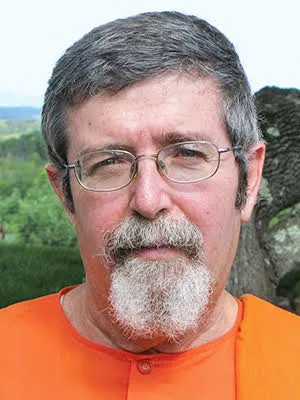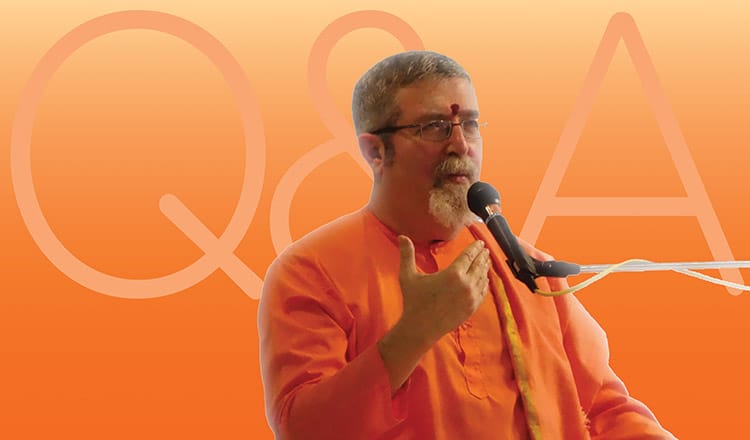Sivananda Bahamas Blog
Expand Your Horizons …
Our Blog
Do Not Be Overwhelmed By the Vedas
Question: The Vedas, with their divisions and sections, seem confusing and overwhelming. How can we explain the Vedas in simple terms to our students, to support the premise that the Vedas are the truth?
Answer: The Vedas are neither confusing nor overwhelming. In fact, before it was divided into four parts, there was only one Veda, and that Veda is the divine knowledge. It is the knowledge of Iswara. It is the knowledge of the Supreme Being, which is infinite. It is the infinite knowledge of the only one that is omniscient, which is Iswara, or the Ultimate Reality. The Veda is the knowledge of God, or the knowledge of Ultimate Reality, or the knowledge of the Self. This is what the Veda is.
This knowledge, it is said, is supra-human. It did not originate in a human mind, which cannot generate this type of knowledge. It comes from the mind of God, and when we say the mind of God, we mean it comes from Ultimate Reality. It is a revealed knowledge. The rishis, in their deep, deep, deep samadhi discovered the ultimate truths about reality, and these divinely inspired sages revealed what they discovered to humanity. These revelations, put together, are called the revealed Veda -- the revealed knowledge of the Supreme Being, or of Ultimate Reality, or reality as it truly is. This is the knowledge of the Veda, which was never invented by human beings. The rishis received it from the creator, from Brahma, and the creator himself received the Veda from the highest aspect of the creator, which we call Iswara. This is how it is.
There is a law of gravity, for example, and whether you believe in it or not, it will affect you. This law of gravity existed prior to Newton. Newton did not invent the law of gravity; it did not come from his mind. The law of gravity simply is a universal law and it is there whether you know about it or not, whether you believe in it or not, but at a certain point in history someone discovered it.
Similarly, the rishis made many spiritual discoveries, and then they revealed this to humanity, and this body of knowledge is called the Veda. This knowledge was passed on from generation to generation, from the mind of an enlightened teacher to the heart of a capable disciple. Initially, this transmission was oral. This knowledge was not transmitted in writing.
Then, at a certain point in history, Veda Vyasa wrote down this knowledge, and divided it into four parts even though the Veda actually is one. Because the Veda is the universal knowledge of the creator, it is not something that is destructible. It is simply there, and even if all the books are burned, it will be rediscovered.
In the Veda as four parts, there is a section called Mantra Samhita. Mantra Samhita consists of the Vedic hymns, which are invocations – very powerful invocations – to the whole divine kingdom. There are, according to the Vedic knowledge, 33 million gods or 33 million aspects of the Supreme Being, and in the Mantra Samhita, these aspects are being invoked. To invoke means you are doing what is necessary to establish direct contact with that reality, and if you want to have direct contact, or direct realization, of God, you have to invoke God. If I want to have direct realization of Lord Krishna, I have to invoke Lord Krishna. Therefore, the Mantra Samhita teaches us how to communicate with the Divine Reality; how to be in direct communion with the Divine Reality. This is what the Mantra Samhita -- or the Vedic hymns, which consist of Vedic mantras -- teaches us.
The second part of the Vedas are called Brahmanas. Brahmanas are those Vedic sections that teach about sacrifice. According to the Vedic knowledge, the whole creation is a cosmic sacrifice. The meaning of sacrifice is that something has to give itself, completely, in order for something else to exist. It is said in the Vedas that the original sacrifice was the sacrifice of the Purusha, the sacrifice of the Supreme Being, which brought forth this creation consisting of many, many things. The Veda is saying that this whole creation is nothing but the result of the self-sacrifice of the Supreme Being. Following the original self-sacrifice of the Supreme Being, which we call the cosmic sacrifice, the whole creation is governed by sacrifice, which means simply that in order for me to exist, something else has to give its life. Look at this body, which consists of food. For this body to exist, something else must give its life. The trees have to generate oxygen, so I can breathe. I have to generate carbon dioxide so the trees can live. If you look at the whole creation, everything in it exists because of the kindness of everything else. Everyone within this creation gives himself so that everyone else can exist. If you meditate on it, you will see how everything is based on sacrifice. Absolutely every single entity within this creation gives itself completely so that everything else can exist. This body consists of stardust. All the materials in the body were cooked within stars, which died -- gave themselves -- so that this body can exist. It's like this.
Understanding that sacrifice is the foundation of everything that exists, there is a section in the Veda that not only explains sacrifice, but explains how human beings can perform rituals or sacrifices so they can support the other kingdoms within creation. In this way the human beings who perform these rituals, or sacrifices, are supporting the rest of creation, in a similar manner to how the rest of creation supports us. It is interdependent; it is mutual. The Brahmanas explain the Vedic rituals, and the Vedic rituals are accompanied by the mantras, by the Vedic hymns, which are the invocation to the divine kingdom. There is direct communion, direct communication and then there is this exchange, which we receive from the gods, and we give to the gods, and everything is interconnected.
The third part of the Veda consists of the aranyakas, and is called Upasana Kanda. Upasana Kanda means there is a section of the Vedas where you internalize the mantra, and you internalize the rituals. When the ritual and the mantras become internal, they take the form of meditations. In the Upasana Kanda, devotion and meditation replace the external actions of recitation of the mantras, and of the external rituals. Everything is internalized. This part of the Veda teaches about the internalization of the external actions -- the recitation of the Vedic mantras and the performance of the Vedic rituals.
Ultimately, the fourth part of the Veda deals with the knowledge of Ultimate Reality, and it is the goal and the purpose and the essence of the Veda. It is also the end portions of the Veda, and these are the Upanishads. Therefore, the Upanishads are called Vedanta, because they are the end portions of the Veda, and they are also the essence and the goal of the Veda. The Upanishads simply teach about Ultimate Truth, Ultimate Reality, the ultimate truth of all existence.
Generally speaking, the Vedas are teaching about two dharmas -- pravritti dharma, which is how to take care of creation, and nivritti dharma, which is how to transcend creation and to realize Ultimate Truth. Therefore you can see that the subject is neither confusing nor overwhelming. It is actually wonderful, and I highly recommend that you take a look at the Vedic hymns, and at the Brahmanas, and at the aranyakas. They are most wonderful, and all have been translated into the English language, so it is possible to experience them.

Swami Swaroopananda is a senior disciple of Swami Vishnudevananda. A practicing yogi from a very young age, Swami Swaroopananda has dedicated his life to the practice and teaching of yoga. He taught in Yoga Teacher Training Courses around the world and is currently teaching advanced yoga philosophy courses and lectures internationally. He is Director of the Sivananda Ashram Yoga Retreat and acharya (spiritual director) for the Sivananda centers and ashrams in the Bahamas and the Middle East. He is a member of the Board of Directors of the International Sivananda Yoga Vedanta Centres.
Upcoming Courses
Swami Swaroopananda answers aspirants’ questions, clears troubled minds, and inspires listeners to advance on the spiritual path.
Swami Swaroopananda answers aspirants’ questions, clears troubled minds, and inspires listeners to advance on the spiritual path.
Celebrate a beautiful Easter morning on Paradise Island with traditional Easter singing, stories, and messages of hope.
Swami Swaroopananda answers aspirants’ questions, clears troubled minds, and inspires listeners to advance on the spiritual path.
Swami Swaroopananda answers aspirants’ questions, clears troubled minds, and inspires listeners to advance on the spiritual path.
Swami Swaroopananda answers aspirants’ questions, clears troubled minds, and inspires listeners to advance on the spiritual path.
Swami Swaroopananda answers aspirants’ questions, clears troubled minds, and inspires listeners to advance on the spiritual path.
Swami Swaroopananda answers aspirants’ questions, clears troubled minds, and inspires listeners to advance on the spiritual path.
Swami Swaroopananda answers aspirants’ questions, clears troubled minds, and inspires listeners to advance on the spiritual path.
Swami Swaroopananda answers aspirants’ questions, clears troubled minds, and inspires listeners to advance on the spiritual path.
Swami Swaroopananda answers aspirants’ questions, clears troubled minds, and inspires listeners to advance on the spiritual path.
During this special time of year we invite you to join us in celebrating wisdom, love, compassion, and the transcendence of artificial barriers.
Swami Swaroopananda answers aspirants’ questions, clears troubled minds, and inspires listeners to advance on the spiritual path.
Swami Swaroopananda answers aspirants’ questions, clears troubled minds, and inspires listeners to advance on the spiritual path.
Swami Swaroopananda answers aspirants’ questions, clears troubled minds, and inspires listeners to advance on the spiritual path.
Swami Swaroopananda answers aspirants’ questions, clears troubled minds, and inspires listeners to advance on the spiritual path.
Swami Swaroopananda answers aspirants’ questions, clears troubled minds, and inspires listeners to advance on the spiritual path.
Swami Swaroopananda answers aspirants’ questions, clears troubled minds, and inspires listeners to advance on the spiritual path.
Swami Swaroopananda answers aspirants’ questions, clears troubled minds, and inspires listeners to advance on the spiritual path.
Swami Swaroopananda answers aspirants’ questions, clears troubled minds, and inspires listeners to advance on the spiritual path.
Swami Swaroopananda answers aspirants’ questions, clears troubled minds, and inspires listeners to advance on the spiritual path.
Swami Swaroopananda answers aspirants’ questions, clears troubled minds, and inspires listeners to advance on the spiritual path.
Swami Swaroopananda answers aspirants’ questions, clears troubled minds, and inspires listeners to advance on the spiritual path.
Swami Swaroopananda answers aspirants’ questions, clears troubled minds, and inspires listeners to advance on the spiritual path.
Swami Swaroopananda answers aspirants’ questions, clears troubled minds, and inspires listeners to advance on the spiritual path.








